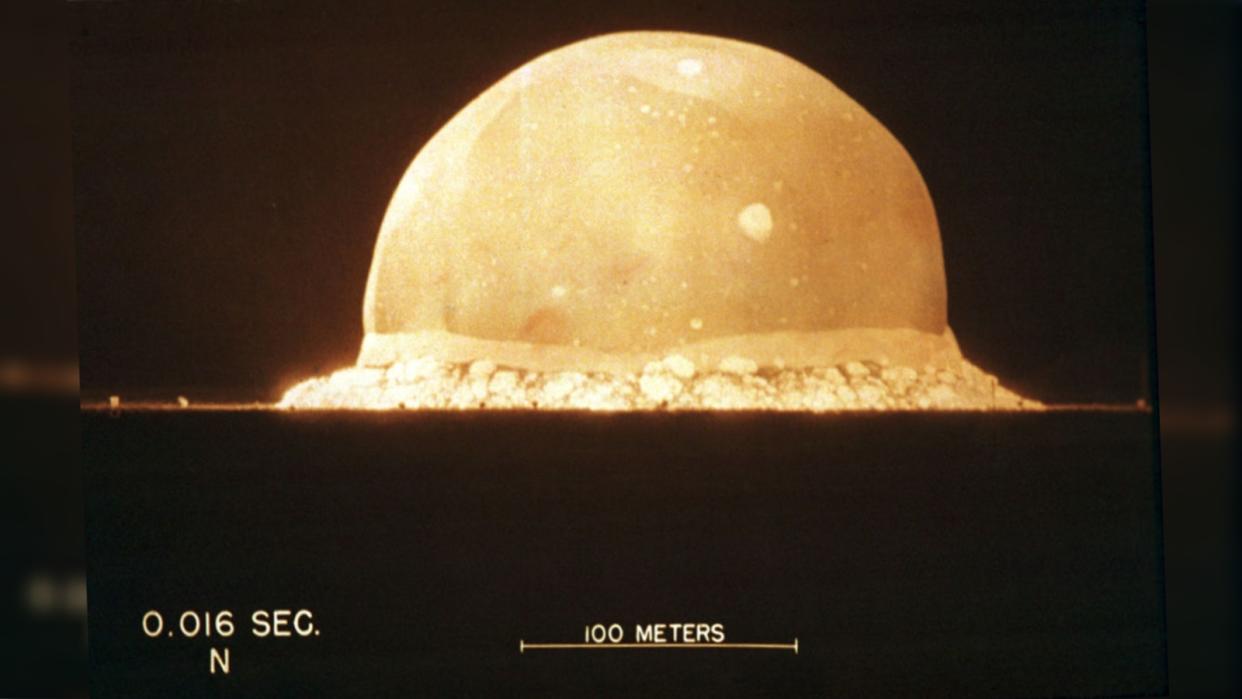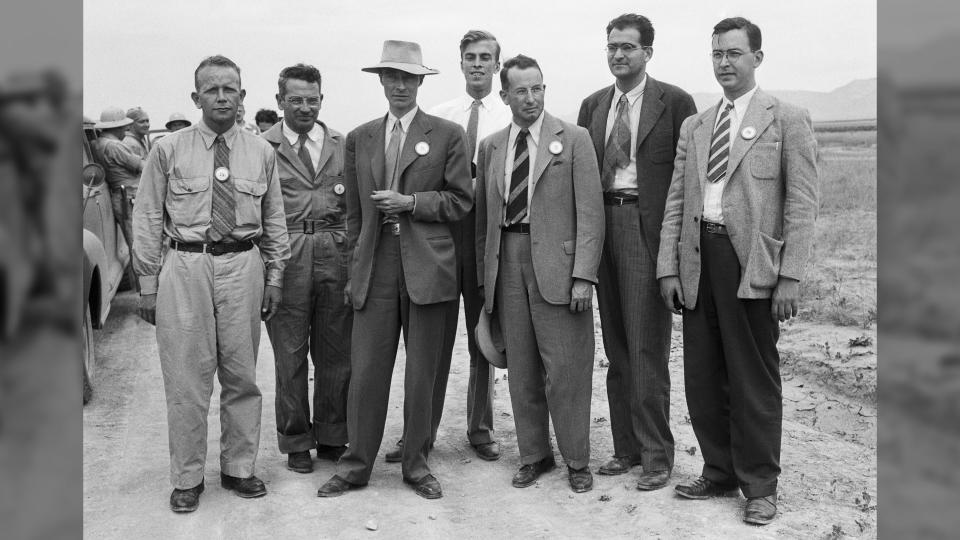'The night turned into day': How Manhattan Project scientists reacted to the world's first atomic bomb test

- Oops!Something went wrong.Please try again later.
- Oops!Something went wrong.Please try again later.
To celebrate the release of the Christopher Nolan biopic "Oppenheimer," below is an extract from the book the movie is based on, "American Prometheus: The Triumph and Tragedy of J. Robert Oppenheimer" (Knopf, 2005), by Kai Bird and Martin J. Sherwin.
RICHARD FEYNMAN was standing 20 miles from the Trinity site when he was handed dark glasses.
He decided he wouldn't see anything through the dark glasses, so instead he climbed into the cab of a truck facing Alamogordo. The truck windshield would protect his eyes from harmful ultraviolet rays, and he'd be able actually to see the flash. Even so, he reflexively ducked when the horizon lit up with a tremendous flash. When he looked up again, he saw a white light changing into yellow and then orange: "A big ball of orange, the center that was so bright, becomes a ball of orange that starts to rise and billow a little bit and get a little black around the edges, and then you see it's a big ball of smoke with flashes on the inside of the fire going out, the heat." A full minute and a half after the explosion, Feynman finally heard an enormous bang, followed by the rumble of man-made thunder.
James Conant had expected a relatively quick flash of light. But the white light so filled the sky that for a moment he thought "something had gone wrong" and the "whole world has gone up in flames."
"I could feel the heat on my face a full twenty miles away."
Bob Serber was also 20 miles away, lying face down and holding a piece of welder's glass to his eyes. "Of course," he wrote later, "just at the moment my arm got tired and I lowered the glass for a second, the bomb went off. I was completely blinded by the flash." When his vision returned 30 seconds later, he saw a bright violet column rising to 20,000 or 30,000 feet. "I could feel the heat on my face a full 20 miles away."

Joe Hirschfelder, the chemist assigned to measure the radioactive fallout from the explosion, later described the moment: "All of a sudden, the night turned into day, and it was tremendously bright, the chill turned into warmth; the fireball gradually turned from white to yellow to red as it grew in size and climbed into the sky; after about five seconds the darkness returned but with the sky and the air filled with a purple glow, just as though we were surrounded by an aurora borealis. . . . We stood there in awe as the blast wave picked up chunks of dirt from the desert soil and soon passed us by."
Related: What was the Manhattan Project?
Frank Oppenheimer was next to his brother [Robert] when the gadget exploded. Though he was lying on the ground, "the light of the first flash penetrated and came up from the ground through one's [eye]lids. When one first looked up, one saw the fireball, and then almost immediately afterwards, this unearthly hovering cloud. It was very bright and very purple." Frank thought, "Maybe it's going to drift over the area and engulf us." He hadn't expected the heat from the flash to be nearly that intense. In a few moments, the thunder of the blast was bouncing back and forth on the distant mountains. "But I think the most terrifying thing," Frank recalled, "was this really brilliant purple cloud, black with radioactive dust, that hung there, and you had no feeling of whether it would go up or would drift towards you."
Oppenheimer himself was lying facedown, just outside the control bunker, situated 10,000 yards south of ground zero. As the countdown reached the two-minute mark, he muttered, "Lord, these affairs are hard on the heart." An Army general watched him closely as the final countdown commenced: "Dr. Oppenheimer . . . grew tenser as the last seconds ticked off. He scarcely breathed. . . . For the last few seconds he stared directly ahead and then when the announcer shouted 'Now!' and there came this tremendous burst of light followed shortly thereafter by the deep growling roar of the explosion, his face relaxed into an expression of tremendous relief."
"Lots of boys not grown up yet will owe their life to it."
RELATED STORIES
—Oppenheimer: Everything we know about the atomic bomb creator's epic new biopic
—What was Earth's biggest explosion?
—8 wild stories about J. Robert Oppenheimer, the 'father of the atomic bomb'
We don't know, of course, what flashed through Oppie's mind at this seminal moment. His brother recalled, "I think we just said 'It worked.'"
Afterwards, [physicist Isidor] Rabi caught sight of Robert from a distance. Something about his gait, the easy bearing of a man in command of his destiny, made Rabi's skin tingle: "I'll never forget his walk; I'll never forget the way he stepped out of the car. . . . his walk was like High Noon . . . this kind of strut. He had done it."
"Later that morning, when William L. Laurence, the New York Times reporter selected by Groves to chronicle the event, approached him for comment, Oppenheimer reportedly described his emotions in pedestrian terms. The effect of the blast, he told Laurence, was "terrifying" and "not entirely undepressing." After pausing a moment, he added, "Lots of boys not grown up yet will owe their life to it."

American Prometheus: The Triumph and Tragedy of J. Robert Oppenheimer - $14.99 at Amazon
The definitive biography of J. Robert Oppenheimer, one of the iconic figures of the twentieth century, a brilliant physicist who led the effort to build the atomic bomb for his country in a time of war, and who later found himself confronting the moral consequences of scientific progress.
Extracted from American Prometheus: The Triumph and Tragedy of J. Robert Oppenheimer by Kai Bird and Martin J. Sherwin published by Atlantic Books (2023).

